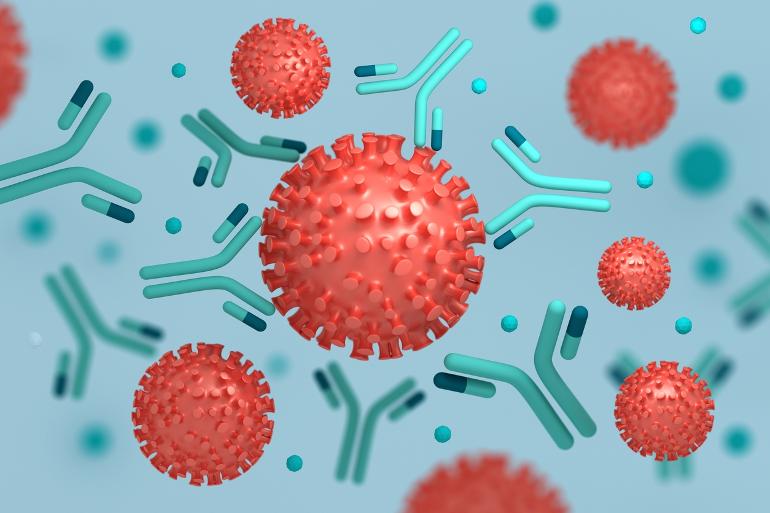Illustrative image: Neutralizing antibodies attack SARS-CoV-2. (iStock via Getty Images)
By NATHAN JEFFAY
Team says such tests could be used as a screening tool for the allocation of the first batches of updated vaccines, once these arrive
Throughout the coronavirus pandemic, scientists have been reticent about using results of standard antibody tests to judge COVID immunity levels. But new Israeli research suggests such tests can be a reliable indicator.
The scientists behind the study say such tests could be used as a screening tool for allocation of the first batches of updated vaccines, once these arrive.
Until now, the only dependable way for scientists to judge COVID protection levels based on antibodies has been to measure blood levels of so-called neutralizing antibodies, which have been documented to attack SARS‑CoV‑2. This hard-to-conduct measurement requires a specialized lab process that is costly, spans over several days, and is therefore not scalable for widespread use.
More general antibody tests, which labs can quickly process using kits that cost just a few dollars, give a snapshot of Immunoglobulin G (IGG) antibodies in the blood. They have been used to give yes-no answers to whether a person has either been vaccinated or has recovered from COVID-19, but haven’t been widely used to judge what level of protection they have. Whilst it has been widely assumed that the tests give some indication of immunity levels, this had not been confirmed.
Now, a team of Israeli immunologists, epidemiologists and other researchers says it has gotten that confirmation. Led by Ben Gurion University professors Tomer Hertz, Ran Taube and Lior Nesher, it has published its research results online, but these have not yet been peer-reviewed.
Hertz told The Times of Israel: “We have successfully identified antibody markers that are predictive of the risk of infection, well enough that we could now establish a system for assessing this based on antibody levels.
“Until now, we haven’t had enough confidence that results from simple antibody tests constitute reliable indicators of infection risk, but the results of our study mean that good quality test kits could be relied upon.”
Throughout the pandemic scientists have been hoping that the easily-measurable IGG levels are indicators of overall antibody power against the coronavirus. But this was hard to prove, as it required a population of people whose antibodies were checked and then tracked for infection patterns. For the statistics to be reliable, there needed to be high levels of infection.
Hertz’s team found such an opportunity during Israel’s winter coronavirus wave. It recruited a sample of 608 healthy adults, and during the first 90 days of follow-up, 239 (39%) were infected.
The team found a clear correlation between levels of IGG and infection levels, and documented how results can best be read by doctors to predict infection risk.
Hertz explained: “The fact that we had lots of infection meant that even a sample of this size could give an insight into correlation between the antibodies shown in simple tests and infection risk. This can have practical uses. If we get to a point where new variants are coming along and we’re keen to use the new vaccines which are being produced and expected to be available soon — the ones with added protection against variants — we can expect shortages of new vaccines. Relatively simple tests can help with allocations.
“This just hasn’t been done until now, as the relevance of antibody test results on infection levels hasn’t been formally proved. Yet now such an approach could make sense.”
